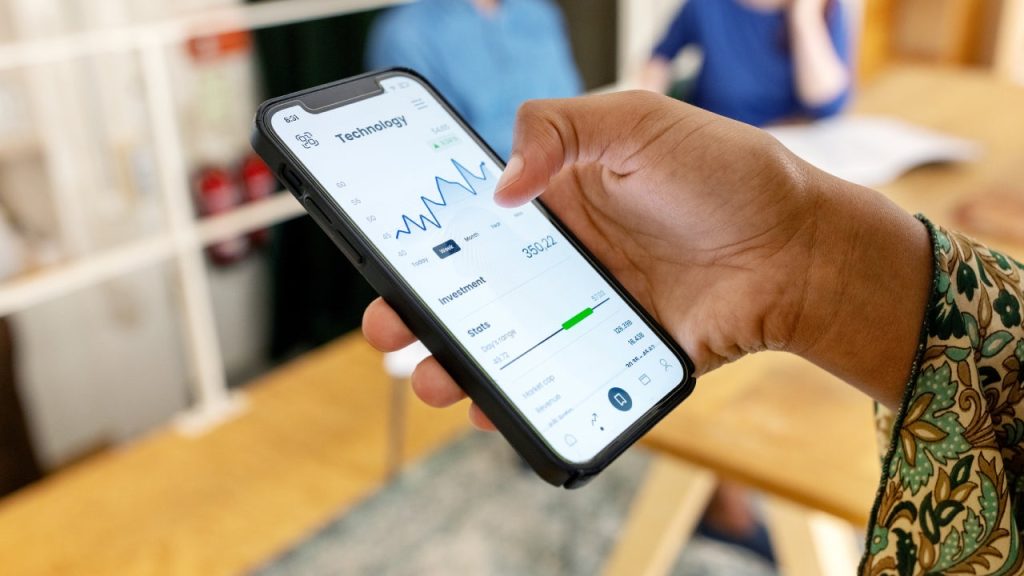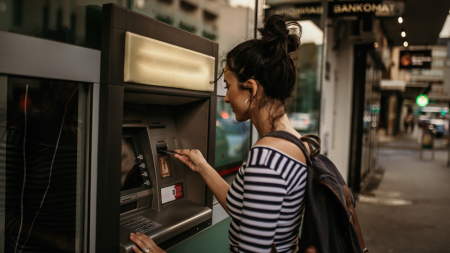Key takeaways
- Money market accounts combine features of savings and checking accounts, offering interest earnings with convenient access to your funds.
- Advantages include competitive yields, federal insurance protection and the ability to write checks and use debit cards for transactions.
- Disadvantages may include minimum balance requirements, monthly fees and transaction limits that could impact your savings strategy.
- Money market accounts work well for emergency funds, short-term savings goals and keeping funds you need occasional access to.
A money market account is a deposit account that earns interest while providing easier access to your cash than traditional savings accounts. You can find money market accounts, also known as MMAs, at banks and credit unions nationwide.
These accounts combine the best features of savings and checking accounts. Similar to a savings account, money market accounts earn interest and help your money grow over time. You can often find competitive annual percentage yields (APYs), though there may be limits on how many withdrawals you can make per month.
Similar to a checking account, you may be able to write checks with an MMA or make purchases and withdrawals with a debit card. While it’s possible for savings accounts to offer these features, it’s rare and more common for money market accounts to provide this flexibility.
Advantages of money market accounts
Money market accounts offer several compelling benefits that make them attractive options for certain financial goals.
MMAs earn interest
Because MMAs earn interest, they’re an excellent tool to grow your money while maintaining access to it. As of May. 30, 2025, the average money market account rate is currently 0.46 percent, according to Bankrate data. However, you can do much better by shopping around.
The best money market rates are significantly higher than the average, with some topping 4 percent. These competitive yields help your savings grow faster than traditional savings accounts while keeping your funds accessible when you need them.
Bankrate Insight: Rate shopping pays off
Don’t just settle for average rates. The difference between a 0.45 percent average rate and a 4+ percent high-yield rate can mean hundreds of dollars in additional earnings on a $10,000 balance over just one year.
You have easy access to cash
You don’t have to jump through hoops to withdraw money from a money market account when you need it. This liquidity makes money market accounts ideal for emergency funds and short-term savings goals.
Many money market accounts come with debit cards for ATM access and check-writing privileges. While there could be a limit of six withdrawals per statement period, this still provides more flexibility than certificates of deposit or other time-locked savings products.
Money is protected by federal insurance
At federally insured institutions, you don’t have to worry about the safety of funds in a money market account, up to coverage limits. Provided the bank or credit union has insurance from the Federal Deposit Insurance Corp. (FDIC) or National Credit Union Administration (NCUA), respectively, up to $250,000 per depositor and per account ownership type is protected even if the institution fails.
You can verify your bank’s insurance status using the FDIC Bank Find tool or the NCUA website.
Check-writing and debit card potential
One of the biggest advantages of money market accounts is their transaction flexibility. Unlike most savings accounts, many MMAs provide check-writing capabilities and debit card access, making them more versatile for your financial needs.
Check writing allows you to pay bills directly from your money market account, which can be particularly useful for large expenses like rent or contractors where checks are preferred payment methods. Debit card access lets you make purchases or withdraw cash from ATMs when needed, offering additional convenience.
Disadvantages of money market accounts
While money market accounts offer many benefits, they also come with limitations that may not suit every financial situation.
Better rates may be available elsewhere
While the best money market accounts offer competitive earning potential, you might find higher interest rates with other savings products, though you may have to make trade-offs.
For example, you could earn just as much, if not more, in interest with a high-yield savings account, but you likely wouldn’t get checks or a debit card to spend your funds directly from the account.
You could also potentially earn more with a high-yield certificate of deposit, but CDs require a time commitment. You agree to lock up your funds for a certain period in exchange for a guaranteed APY, which eliminates the flexibility that makes money market accounts attractive.
Minimum balance requirements to earn a high rate
Most money market accounts have fairly low minimum balance requirements to open an account — sometimes as little as $0. However, to earn the interest rate that caught your attention, you might need a significant deposit.
Some banks and credit unions require $100,000 or more to earn their highest advertised rates. This can make money market accounts less accessible for those just starting to build their savings or working with smaller balances. Other accounts have tiered rates, where smaller balances earn much lower than the advertised rate.
Rate tiers typically work like this:
- $0-$9,999: Lower APY
- $10,000-$24,999: Mid-tier APY
- $25,000+: Highest advertised APY
Always check the rate structure before opening an account to ensure you can realistically meet the requirements for the rate you want.
Banks may charge monthly fees
Monthly service fees can quickly erode your interest earnings if you’re not careful. Some money market accounts charge $10-$25 per month in maintenance fees, which could completely offset the interest you earn on smaller balances.
However, many accounts offer ways to waive these fees by maintaining a certain minimum balance or setting up direct deposits. When shopping for accounts, look for money market accounts that charge no monthly fees or make fee waivers easy to achieve.
Here are a couple of common ways to avoid fees:
- Choose accounts with no monthly fees
- Maintain minimum balances to waive fees
- Set up qualifying direct deposits
- Use online banks, which typically have lower fees
What should you open a money market account for?
The combination of safety, liquidity and yield makes money market accounts excellent candidates for several key pieces of your financial portfolio.
- Your emergency fund: Money market accounts are ideal for an emergency fund because they keep your safety net accessible while earning interest. The check-writing ability can be particularly valuable for large emergency expenses like major home repairs.
- Your short-term savings goals: Whether you’re saving for a vacation, wedding or down payment, money market accounts provide a safe place to accumulate funds while earning interest. The debit card access makes it easy to use saved funds when you’re ready to make purchases.
- Your tax payments: For independent contractors and freelancers, money market accounts offer an excellent way to separate tax money from spending money. You can earn interest on funds earmarked for quarterly tax payments while keeping them easily accessible.
- Your next big purchase: When saving for a car, appliance or other major purchase, money market accounts allow you to write a check directly when you’re ready to buy, eliminating the need to transfer funds between multiple accounts.
While online high-yield savings accounts and CDs are also options for these goals, money market accounts might be better when you need frequent access or want payment flexibility.
Money market accounts vs. savings accounts
When deciding between money market accounts and savings accounts, consider your priorities around access, features and rates.
Transaction capabilities: Unlike most savings accounts, money market accounts typically provide check-writing privileges and debit card access. If you don’t need these features, a standard high-yield savings account might offer similar or better rates with fewer restrictions.
Interest rates: Both account types can offer competitive yields, but some of the best savings account rates currently exceed money market rates. Compare specific offerings rather than assuming one type always pays more.
Minimum balance requirements: Money market accounts often have higher balance requirements to earn the best rates, while many high-yield savings accounts offer top rates regardless of balance size.
Money market accounts vs. money market funds
Despite their similar names, money market accounts and money market funds are completely different products with distinct risk profiles and features.
Money market accounts are bank deposit products insured by the FDIC or NCUA up to $250,000 per depositor. They function like hybrid savings-checking accounts with guaranteed principal protection and modest, stable returns.
Money market funds are investment products offered by brokerages and mutual fund companies. These funds invest in short-term, low-risk securities like Treasury bills and commercial paper. While they typically offer higher potential returns than money market accounts, they come with important differences:
| Money market accounts | Money market funds |
|---|---|
| FDIC/NCUA insured up to $250,000 | Not federally insured |
| Principal guaranteed | Principal can fluctuate |
| Lower, stable returns | Potentially higher returns |
| Check writing and debit cards | Limited transaction options |
| Bank deposit product | Investment product |
Money market funds aren’t suitable for emergency funds or money you can’t afford to lose, as their value can decline during market stress. Money market accounts provide the safety and guaranteed access that most savers need for their short-term goals.
Bottom line
Money market accounts offer a combination of safety, growth potential and accessibility that makes them valuable tools for specific financial goals. The ability to earn competitive interest while maintaining check-writing and debit card privileges provides flexibility that pure savings accounts can’t match.
For emergency funds, short-term savings goals and money you need occasional access to, money market accounts can be excellent choices. Just make sure the account you choose aligns with your balance expectations and access needs.
Next steps: Ready to find the right money market account? Compare Bankrate’s best money market accounts to see current rates and features.
Read the full article here









